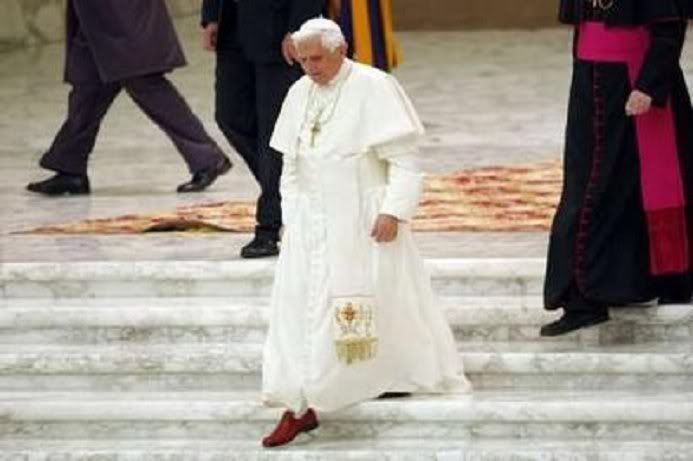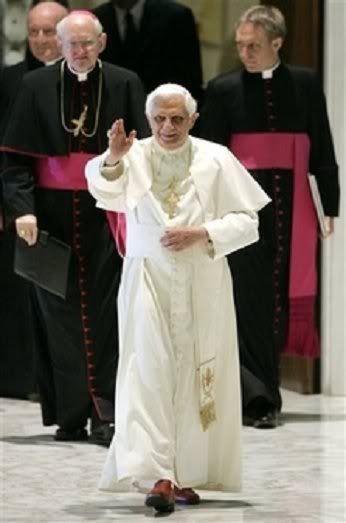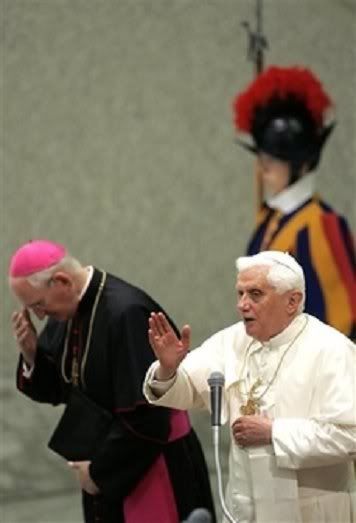 It is Wednesday so It is Papal Wednesday Audience time.
It is Wednesday so It is Papal Wednesday Audience time.Pope Benedict talks again on the Church Fathers. Today it is Romanus the Melodist who was born in Syria at the end of the fifth century. This is a incredible presentation that hits a ton of themes. I also liked how the Holy Father links it what our concerns about the Liturgy today. Thanks again to the Ratzinger forum for the pics and also the translation. There is a lot here. The Catholic News servies are running with Christian-inspired art, music are living treasures, pope says and Church musical tradition endures today, Pope tells audience and Living faith rescues our cultural heritage from the past, Pope as their story lines to today's Wednesday audience
 Because of bad weather and heavy rain, the outdoor audience scheduled for today was moved indoors. Accordingly, the Holy Father first greeted the faithful inside St. Peter's Basilica, then proceeded to Aula Paolo VI for his catechesis. Despite the bad weather, some 15,000 faithful showed up for the audience. Here is a translation of the Holy Father's catechesis:
Because of bad weather and heavy rain, the outdoor audience scheduled for today was moved indoors. Accordingly, the Holy Father first greeted the faithful inside St. Peter's Basilica, then proceeded to Aula Paolo VI for his catechesis. Despite the bad weather, some 15,000 faithful showed up for the audience. Here is a translation of the Holy Father's catechesis: Dear brothers and sisters, In the series of catecheses on the Fathers of the Church, I wish to speak today about a little-known figure: Romanus the Melodist, born around 490 in Emesa (present-day Homs) in Syria. A theologian, poet and composer, he belongs to that great line of theologians who transformed theology to poetry. We may think of his compatriot, St. Ephraim of Syria, who lived 200 years earlier than he. But we can also think of the theologians of the West, like St. Ambrose, whose hymns still form part of our liturgy and continue to touch our hearts; or a theologian-thinker of great strength like St. Thomas, who gave us the hymns for Corpus Domini which we celebrate tomorrow. We think of St. John of the Cross and so many others. Faith is love, and therefore, it creates poetry and music.
Faith is joy, so it creates beauty. And Romanus the Melodist is one of these - a theologian poet and composer. Having learned the first elements of Greek and Syrian culture in his native city, he transferred to Beritus (now Beirut), to complete his classical education and perfect his rhetorical skills. Ordained a permanent deacon around 515, he became a preacher in that city for three years. He transferred to Constantinople towards the end of the reign of Anastasius I (around 518), and settled in the monastery of the Church of the Theotokos, Mother of God.
It was there that a long key episode in his life took place: the Sinassarium tells us that the Mother of God appeared to him in a dream and he received the gift of poetic charism. That Mary, in fact, asked him to swallow a rolled-up paper. When he woke up the next day - Feast of the Lord's Nativity - Romanus preached from the pulpit: "Today the Virgin gives birth to the Transcendent" (Hymn 'On the Nativity' I. Proemium). And that is how he became a homilist-cantor up to his death (after 555). Romanus lives in history as one of the most representative authors of liturgical hymns. The homily was, for the faithful of his time, practically the only occasion for catechetical instruction.
Thus, Romanus is not only an eminent witness to the religious sentiment of his era, but also of a lively and original way of catechesis. Through his compositions, we realize the creativity of this way of catechesis, the creativity of theological thinking, and of the sacred aesthetics and hymnography of that time.
The place where Romanus preached was a shrine in the outskirts of Constantinople. He would ascend the pulpit in the center of the church and spoke to the community using a rather elaborate 'setting' - he used depictions on the church murals or icons decorating the pulpit to illustrate his homilies, and even used dialog. His homilies were in sung metric verse called kontakia. The term 'kontakion' - a small staff - appears to refer to the rod which holds the scroll of a manuscript, liturgical or otherwise.
There are 89 kontakia that have lived to our day under the name of Romanus, but tradition attributes thousands to him. In Romanus, every kontakion is composed of stanzas, mostly 18 or 24, with a similar number of syllables structured according to the pattern of the first stanza (irmo); the rhythmic accents of the verses in all the stanzas are modelled after the irmo. Each stanza ends with a refrain (efimnio) that is usually identical, to create poetic unity. Moreover, the first letters of every stanza indicated acrostically the name of the author, often preceded by the adjective 'humble'. A prayer referring to the lessons celebrated or evoked concludes the hymn. After the Biblical reading, Romanus would sing the Proemium, often in the form of a prayer or supplication. Thus, he announced the theme of the homily and explained the refrain to be repeated together at the end of every stanza, which he recited aloud in cadence.
We are offered a significant example in the kontakion for Passion Friday: it is a dramatic dialog between Mary and her Son which takes place during the way of the Cross. Mary says: "Where are you going, my Son? Why have you completed so quickly the course of your life?/ Never did I think, my Son, to see you in this state/ Nor ever imagine to what point of fury the wicked would come/ To lay their hands on you against everything that is just." Jesus responds: "Why do you cry, my mother? ... Should I not suffer? Should I not die?/ How otherwise would I be able to save Adam?" Mary's son comforts his mother, but also reminds her of his role in the story of salvation: "Therefore, my mother, lay down your sorrow/ It is not fitting that you weep, because you have been called 'full of grace'" [Mary at the foot of the Cross, 1-2; 4-5).
In the same hymn, regarding the sacrifice of Abraham, Sara reserves for herself the decision on Isaac's life. Abraham says, "When Sara hears your words, my Lord/ and will have known your will, then she will tell me:/ 'If he who gave him to you will take him back now, why did he give him, to begin with?... You, o watchful one, leave my son to me,/ and when he who called you wants him, he should say so to me" (The sacrifice of Abraham, 7). Romanus did not use the solemn Byzantine Greek used in the imperial court, but simple Greek that was close to the language of the people. I would like to cite here an example of his lively and very personal way of speaking about the Lord Jesus: he calls him 'the spring that does not burn and light against the shadows', and says: "I burn to have you in my hand like a lamp;/ indeed, whoever carries an oil lamp among men is illuminated without being burned./ Illuminate me then, you who are the inextinguishable lamp" (he Presentation, or Feast of encounter, 8).
 The power of conviction in his preachings was based on the great consistency between his words and his life. In one prayer he says: "Make my tongue clear, my Savior, and open my mouth/ and after having filled it, pierce my heart, so that what I do/ should be consistent with what I say" (Mission of the Apostles, 2). Let us examine some of his principal themes.
The power of conviction in his preachings was based on the great consistency between his words and his life. In one prayer he says: "Make my tongue clear, my Savior, and open my mouth/ and after having filled it, pierce my heart, so that what I do/ should be consistent with what I say" (Mission of the Apostles, 2). Let us examine some of his principal themes.
A fundamental theme of his preaching was the unity of God's action in history, the unity between creation and the story of salvation, the unity between the Old and New Testaments. Another important theme was pneumatology, the doctrine about the Holy Spirit. On the Feast of Pentecost, he underlined the continuity between Christ ascended to heaven, and the apostles, that is, the Church, and exalts missionary action in the world: "...with divine virtue, they have conquered all men;/ they have taken up the Cross of Christ like a pen;/ they have used words like fishnets to fish among men;/ they have used the Word of God like a sharp fish-hook/ and as bait, the flesh of the Sovereign of the Universe" ( Pentecost 2;18).
Another central theme is, of course, Christology. He does not go into difficult concepts of theology, much discussed in those days, and which had so torn apart not only the unity among theologians but also among Christians. He preached a simple but fundamental Christology - that of the great Councils. But above all, he kept close to popular piety - after all, the concepts of the Councils were born from popular piety and knowledge of the Christian heart - and thus, Romanus underscored that Christ was true God and true man, and being the true man-God, was one person, the synthesis of creation and creature, in whose human words we hear the Word of God himself. He said: "He was a man, Christ was, but he was also God/ though not divided in two: He is One, son of a Father who is only One" (The Passion 19).
As for Mariology, Romanus, who was grateful to her for the gift of poetic charism, remembers her at the end of almost every hymn, and dedicates to her some of his most beautiful kontakia: Nativity, Annunciation, Divine Motherhood, the New Eve. Finally, his moral teachings have to do with the Last Judgment (The Ten Virgins [II]). He leads us to this moment of truth in our life, the confrontation with the just Judge, and so, he exhorts to conversion in penitence and fasting. Positively, the Christian must practice charity and alms. He emphasizes the primacy of charity over chastity in two hymns, the Marriage at Cana and The Ten Virgins.
Charity is the greatest of virtues: "... Ten virgins possessed the virtue of virginity intact/ but for five of them, the practice proved fruitless./ The others shone with their lamps of love for mankind/ and for this, the Bridegroom asked them in" (The Ten Virgins, 1). A pulsing humanity, the ardor of faith and profound humility pervade the songs of Romanus the Melodist. This great poet and composer reminds us of the whole treasury of Christian culture, born of faith, born from the heart that has encountered Christ, the Son of God. From this contact of the heart with the Truth that is Love, culture is born - the entire Christian culture was born. And if the faith remains alive, this cultural legacy will not be dead, it will remain alive and present.
Icons continue to speak today to the heart of believers - they are not things of the past. Cathedrals are not medieval monuments but houses of life, where we feel 'at home': where we meet God and where we meet each other. Neither is great music - Gregorian chant, Bach or Mozart - a thing of the past. It lives in the vitality of liturgy and in our faith. If faith is alive, Christian culture will never become 'past' but will remain alive and present. And if the faith is alive, even today we can respond to that command that is repeated ever anew in the Psalms: "Sing a new song to the Lord." Creativity, innovation, new song, new culture, and the presence of the entire cultural heritage are not mutually exclusive, but one reality: the presence of the beauty of God and the joy of being his children.
In English, he said:
Dear Brothers and Sisters, In today’s catechesis we turn to the Christian poetry of Romanus the Melodist. Born in Syria at the end of the fifth century, Romanus received a classical education, was ordained a deacon, and settled in Constantinople. His preaching took the form of chanted metrical hymns known as "kontakia", consisting of an introduction and a series of stanzas punctuated by a refrain. Some eighty-nine of these have come down to us, and they testify to the rich theological, liturgical and devotional content of the hymnography of that time.
Composed in simple language accessible to his hearers, these kontakia are notable for their dramatic dialogues and their use of sustained metaphors. Romanus was a catechist concerned to communicate the unity of God’s saving plan revealed in Christ. His hymns, steeped in Scripture, develop the teaching of the early Councils on the divinity of the Son, the mystery of the Incarnation, the person and role of the Holy Spirit, and the dignity of the Virgin Mary.
Romanus shows us the power of symbolic communication which, in the liturgy, joins earth to heaven, and uses imagery, poetry and song to lift our minds to God’s truth. I offer a warm greeting to the delegation from the Allied Joint Force Command Naples, together with the members of their families.
Dear friends, may your cooperation in the service of peace contribute to a future of hope for coming generations. I also welcome the seminarians from the Diocese of Richmond and the many student groups present. I thank the choirs for their praise of God in song. Upon all the English-speaking pilgrims, especially those from England, Denmark, Nigeria, Australia and the United States, I cordially invoke God’s blessings of joy and peace.
No comments:
Post a Comment